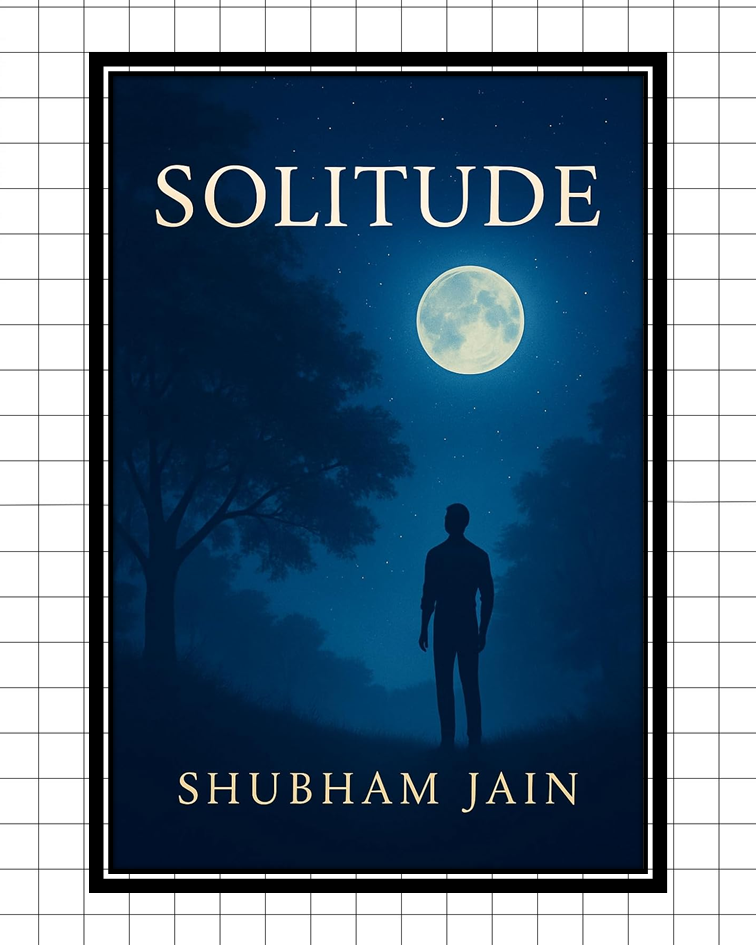Sameer Gudhate Presents the Book Review of Solitude by Shubham Jain
- Sameer Gudhate
- Nov 5, 2025
- 4 min read

It starts like a film with the sound turned low — a ceiling fan humming, rain smudging a window, someone breathing too carefully in the dark. That’s how Solitude opens — not with a scream, but with the kind of silence that makes your skin remember things you’ve tried to forget.
I didn’t pick this book to be scared. I picked it because the title felt eerily familiar. Solitude. That tender, terrifying word. The one that sometimes heals, sometimes destroys. And Shubham Jain, in his haunting debut, knows exactly how to make that word breathe, shiver, and ache on the page.
Before turning writer full-time, Shubham spent years crafting stories for brands. You can feel that precision here — every sentence measured, yet alive with pulse. He’s a Delhi boy who seems to have seen enough faces, heard enough silences, and gathered enough untold stories to realize that true horror doesn’t need monsters; it lives quietly in ordinary people who’ve been left alone too long.
Solitude brings together four of them — Sudha, Asad, Avantika, and Rohan — strangers linked by the thin, trembling thread of loneliness. The book doesn’t rush you. It lures you gently, like a dimly lit corridor where every step echoes a little too loudly. In Sudha’s story, the air feels heavy with things unsaid — the sound of a ceiling fan, the way a woman’s shadow stretches thinner each night beside an indifferent husband. Asad’s story smells of wet earth and danger — Bengaluru’s woods humming with both desire and dread. Avantika’s retreat to the misty Uttarakhand hills offers momentary relief, but the quiet there is treacherous, like a lover holding you too tight. And Rohan, alone by the roaring Andaman sea, watches the beam of a distant lighthouse reveal horrors — not always external.
What makes these stories extraordinary isn’t the supernatural. It’s the ordinary — the way loneliness can warp love, how silence can amplify guilt, how the mind can become its own haunted house. Jain doesn’t rely on jump scares or shock; he builds atmosphere like a slow poison, a creeping unease that grows as you read. The pacing is deliberate — at times slow, but always intentional — mirroring the inertia of those trapped in their inner prisons.
The prose itself is lush, poetic, yet deceptively simple. You can almost hear the crackle of an old radio in a silent living room, smell the dampness of forgotten walls, feel the chill of self-doubt. Jain has a gift for sensory storytelling — he doesn’t just describe solitude, he makes you inhabit it. Some sentences are so precise they feel like paper cuts; others flow like mist, leaving you unsure where reality ends and memory begins.
I was particularly moved by a moment in Sudha’s story — after a sleepless night, she walks through a bustling market, her hands brushing vegetables still wet with morning dew. Everyone else moves in rhythm, and she is somehow out of sync. That image — a woman pretending to belong while her mind spirals elsewhere — stayed with me long after I’d closed the Kindle. We’ve all had such mornings, haven’t we? When the world feels normal but you don’t.
Each story, in its own way, explores the edges of sanity — the fragile line between what we desire and what we fear. Jain’s empathy for his characters is remarkable. He doesn’t mock their weakness or dramatize their pain; he listens. And that’s why his horror cuts deeper. The ghosts here are not gory creatures; they are emotions — regret, yearning, grief — that refuse to leave.
There are moments when the pacing slows a touch too much, particularly in the middle sections, where introspection slightly overpowers tension. But even then, the prose holds you — like watching fog roll over a valley, knowing something waits underneath.
Reading Solitude felt like watching a candle flicker in a quiet room — beautiful, fragile, and slightly dangerous. It reminded me of how often we run from silence, how rarely we sit with our own shadows. In an age of noise and notifications, Jain dares to write about stillness — and how, sometimes, stillness screams.
This is not a book you race through. It’s one you sip slowly, like cold tea forgotten on the windowsill. Perfect for a rainy evening, or for readers who prefer their horror thoughtful, their characters flawed, and their fear intimate. If you’ve ever found comfort in sadness or beauty in emptiness, Solitude will find you.
By the time I finished, I wasn’t sure whether I’d read a horror collection or held a mirror up to my own quiet fears. Perhaps that’s the point. The real ghosts, as Jain reminds us, live inside us — in the empty side of the bed, in unanswered messages, in the echo of a door softly closing.
So if you’re ready for a haunting that doesn’t vanish with the lights on, pick up Solitude. Let it whisper its secrets to you. Just don’t be surprised if, by the last page, you start listening a little differently to your own silence.
#SolitudeByShubhamJain #PsychologicalHorror #IndianAuthor #BookReviewIndia #HorrorBookLovers #ShortStoryCollection #LiteraryHorror #MustReadBooks2025 #BookstagramIndia #FictionThatHaunts #sameergudhate #thebookreviewman




Comments